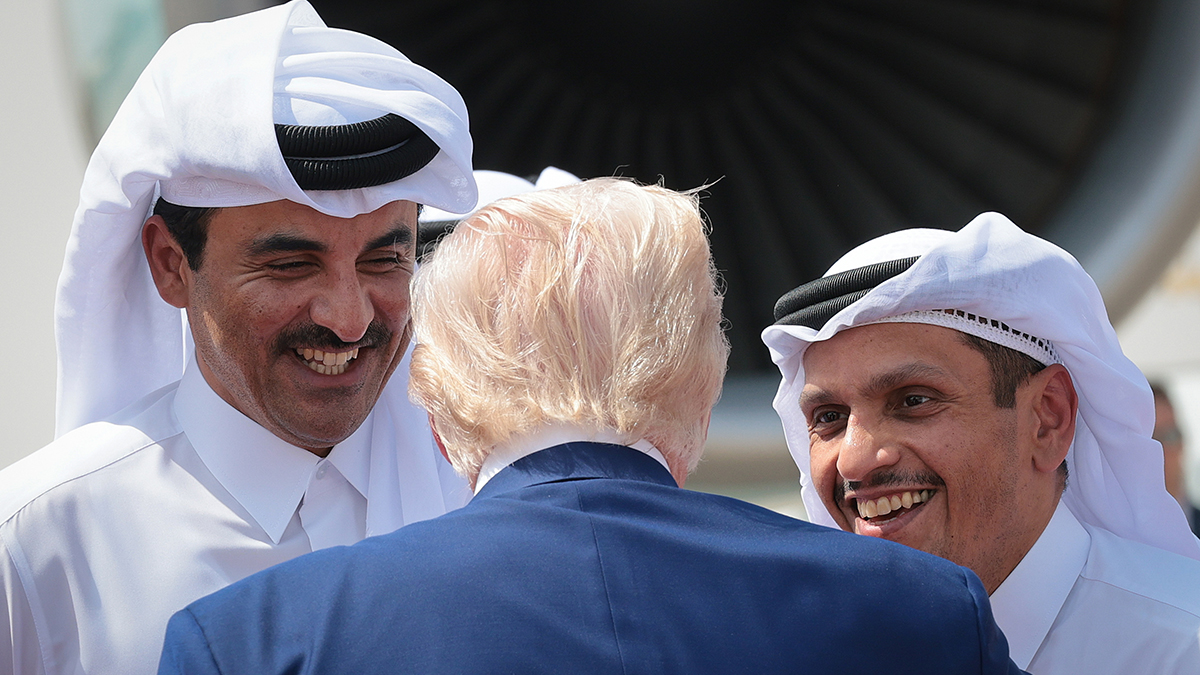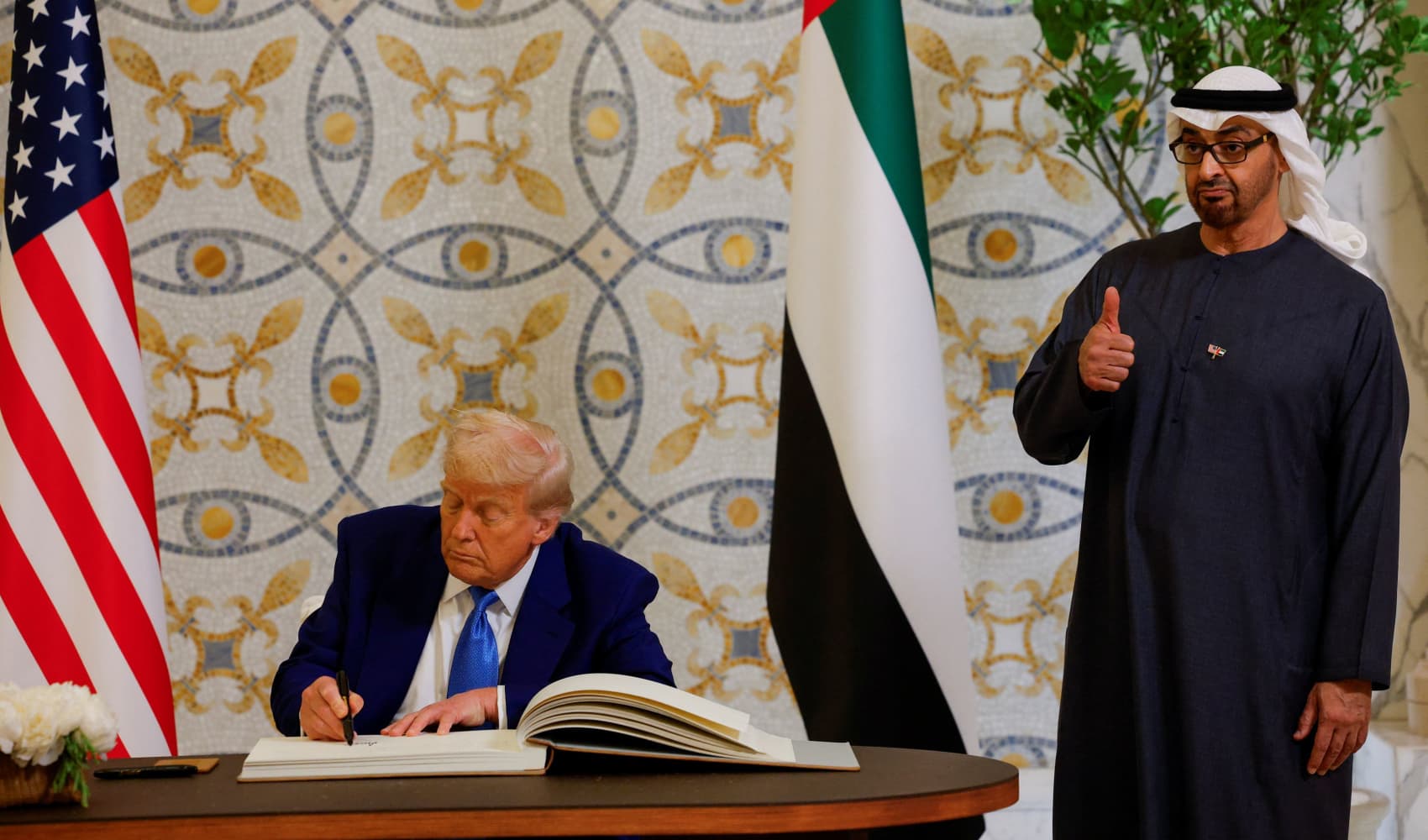Trump's UAE Trip: Supreme Court Birthright Battle Heats Up!
Trump's UAE Visit: Birthright Citizenship in Supreme Court Spotlight
Introduction: A World Stage in Two Acts
Imagine a high-stakes drama playing out on two continents simultaneously. That's essentially what's happening right now. While President Trump is engaging in diplomacy and striking deals in the United Arab Emirates (UAE) and Qatar, the Supreme Court is wrestling with the thorny issue of birthright citizenship back home. Is it a coincidence? Perhaps. But it certainly makes for compelling theater on the world stage. The contrast between these two events highlights the complex and often contradictory policies that shape America's place in the global landscape.
Trump in the Emirates: Beyond the Handshakes
President Trump's visit to Abu Dhabi, the capital of the United Arab Emirates, marks a crucial step in strengthening ties with a key Middle Eastern ally. But what’s really on the agenda? Let's dive in.
A Budding Tech Partnership: AI Takes Center Stage
The White House has announced a significant partnership between the U.S. and the UAE to develop a massive artificial intelligence (AI) campus. Think Silicon Valley meets the Arabian Gulf. This isn't just about technology; it's about future-proofing both nations. This AI campus could represent a significant shift in the global tech landscape, fostering innovation and collaboration between the two countries. What are the implications for global competition and the future of work? Only time will tell.
Qatar Stopover: Military Might and Lucrative Deals
Before arriving in the UAE, President Trump made a stop at Al Udeid Air Base outside Doha, Qatar, addressing U.S. military personnel. He praised their service and celebrated a multibillion-dollar package of business and defense deals sealed with the country. These deals underscore the strategic importance of Qatar to the U.S., particularly in maintaining a military presence in the region.
The Supreme Court Showdown: Birthright Citizenship on Trial
While Trump is overseas, a battle is raging at home – in the hallowed halls of the Supreme Court. The topic? Birthright citizenship, a cornerstone of American identity. Are we about to witness a seismic shift in constitutional law?
The Fourteenth Amendment: The Heart of the Matter
At the center of this legal storm is the Fourteenth Amendment, specifically its citizenship clause, which states that all persons born or naturalized in the United States and subject to its jurisdiction are citizens. This amendment has been interpreted for over a century to guarantee birthright citizenship to virtually all individuals born on U.S. soil. But now, that interpretation is being challenged.
What's Being Challenged? Unpacking the Legal Arguments
The Supreme Court is hearing arguments related to a challenge of a recent attempt to roll back the rights of American citizens. This could be something from voting rights to environmental law, however the birthright citizenship is indirectly impacted. Depending on how this is decided, it could set precedence for further erosion of citizens' rights.
The Potential Ramifications: A Nation Redefined?
If the Supreme Court were to significantly alter the understanding of birthright citizenship, the ramifications would be immense. It could lead to a redefinition of who is considered an American, potentially impacting millions of people. This isn't just a legal debate; it's a fundamental question about national identity.
Iran's Nuclear Gambit: A Deal on the Horizon?
Amidst the diplomatic dance, Iran has reportedly expressed willingness to sign a nuclear deal with the U.S., contingent on the lifting of economic sanctions. Is this a genuine opportunity for de-escalation, or just a strategic maneuver?
The Sanctions Factor: An Economic Pressure Cooker
Economic sanctions have placed immense pressure on Iran's economy, impacting everything from oil exports to everyday life for ordinary citizens. The potential lifting of these sanctions is a powerful incentive for Iran to negotiate.
The U.S. Conditions: What's on the Table?
The U.S. likely has a set of stringent conditions for any new nuclear deal, including verifiable limits on Iran's nuclear program and guarantees against future development of nuclear weapons. Can a compromise be reached that satisfies both sides? That remains to be seen.
The Regional Impact: A Ripple Effect
Any nuclear agreement between the U.S. and Iran would have significant implications for the entire Middle East, impacting relationships with allies like Saudi Arabia and Israel. The regional power dynamics are complex, and any shift in the balance could have far-reaching consequences.
Connecting the Dots: A World in Flux
President Trump's trip to the UAE and the Supreme Court's deliberations on birthright citizenship might seem like separate events, but they are interconnected threads in a larger tapestry of global politics and policy. How do they influence each other?
The Image of America: Projecting Power and Values
The U.S. is constantly projecting an image of itself to the world, both through its diplomatic actions and its domestic policies. The contrast between Trump's engagement with Middle Eastern allies and the potential rollback of birthright citizenship sends a mixed message about American values. What does it say about who we are as a nation?
Economic Implications: Trade, Investment, and Uncertainty
Decisions made by the Supreme Court, such as on birthright citizenship, can affect economic activity, international investment, and trade relationships. A change in policy on birthright citizenship could deter foreign investment and create uncertainty for businesses. Do we need to create an environment that welcomes the best and brightest from around the world to stimulate innovation and entrepreneurship?
Global Leadership: A Shifting Landscape
America's role as a global leader is constantly being challenged and redefined. The way the U.S. approaches issues like immigration and international agreements will have a profound impact on its standing in the world. Are we leading by example, or are we retreating from the global stage?
Navigating the Uncertainty: What Does It All Mean?
These are uncertain times, filled with complex challenges and shifting alliances. How can we make sense of it all? It’s simple – knowledge. Being informed and engaged is crucial for navigating the complexities of the modern world. Stay curious, question everything, and be a part of the conversation.
Conclusion: Looking Ahead
The convergence of President Trump's visit to the UAE and the Supreme Court's examination of birthright citizenship creates a complex snapshot of America's evolving role in the world. Key takeaways include the growing U.S.-UAE partnership in AI, the strategic importance of U.S. military presence in Qatar, the potential for renewed nuclear negotiations with Iran, and the potentially transformative implications of any changes to birthright citizenship laws. Only time will tell how these events will shape the future of the U.S. and its relationships with the world.
Frequently Asked Questions
-
Q: What is birthright citizenship?
A: Birthright citizenship, as enshrined in the Fourteenth Amendment of the U.S. Constitution, guarantees citizenship to almost everyone born in the United States, regardless of their parents' immigration status.
-
Q: Why is birthright citizenship being debated?
A: Some argue that the current interpretation of the Fourteenth Amendment is too broad and that it encourages illegal immigration. They believe that birthright citizenship should only apply to children born to U.S. citizens or legal permanent residents.
-
Q: What is the significance of the U.S.-UAE partnership on AI?
A: The partnership signifies a growing strategic and economic relationship between the two countries, with a focus on developing cutting-edge technology. It also positions both nations as key players in the global AI landscape.
-
Q: What are the potential implications of a new nuclear deal with Iran?
A: A new deal could ease tensions in the Middle East, potentially leading to greater stability. It could also open up new economic opportunities for Iran and the international community. However, it would require careful negotiation and verification to ensure Iran's compliance.
-
Q: How could a change in birthright citizenship laws affect the U.S. economy?
A: It could have various effects, including reduced economic activity due to a smaller workforce, decreased foreign investment due to uncertainty, and potential legal challenges leading to significant costs. There could also be a potential reduction in tax revenue if population growth is slowed.

